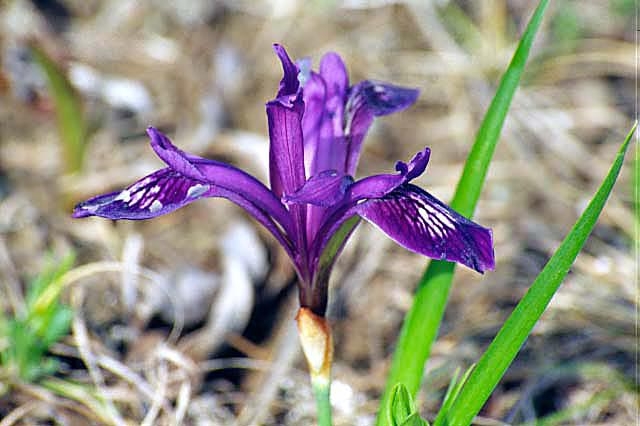Rock Iris
(Iris uniflora)
Rock Iris (Iris uniflora)
/
/

Dr. Nick V. Kurzenko
Public Domain
Image By:
Dr. Nick V. Kurzenko
Recorded By:
Copyright:
Public Domain
Copyright Notice:
Photo by: Dr. Nick V. Kurzenko | License Type: Public Domain | License URL: http://creativecommons.org/licenses/publicdomain/ | Attribution: 2001 Nick Kurzenko | Publisher: Calphotos |












Estimated Native Range
Summary
Iris uniflora, commonly known as Rock Iris, is an evergreen perennial herb, native to meadows and grassy slopes in Northeast Asia, particularly in regions from Siberia to North Korea. It features rhizomatous growth with thin, grass-like leaves and slender flowering stems that can reach up to 15 cm in length, sometimes branching. The Rock Iris typically blooms between May and June, showcasing purple, blue-purple, or violet flowers that are notably fragrant, reminiscent of violets. Each stem normally bears a single flower, but it can occasionally produce two. Following the flowering season, from July to August, the plant produces fruit. The flowers are not only fragrant but also visually appealing, adding a splash of color to garden settings.
Rock Iris is valued for its ease of maintenance and ability to thrive in less fertile conditions, making it a suitable choice for rock gardens, borders, and group plantings. It is particularly effective in dry and sunny positions, where it can flower abundantly. This plant is stable in culture and can overwinter without shelter, making it a resilient choice for temperate gardens. In cultivation, Rock Iris prefers full sun exposure and can tolerate low to medium water conditions, thriving in soils with medium to fast drainage. It is not commonly afflicted by serious diseases or pests, making it a trouble-free addition to the garden.CC BY-SA 4.0
Rock Iris is valued for its ease of maintenance and ability to thrive in less fertile conditions, making it a suitable choice for rock gardens, borders, and group plantings. It is particularly effective in dry and sunny positions, where it can flower abundantly. This plant is stable in culture and can overwinter without shelter, making it a resilient choice for temperate gardens. In cultivation, Rock Iris prefers full sun exposure and can tolerate low to medium water conditions, thriving in soils with medium to fast drainage. It is not commonly afflicted by serious diseases or pests, making it a trouble-free addition to the garden.CC BY-SA 4.0
Plant Description
- Plant Type: Bulb
- Height: 0.3-1.2 feet
- Width: 0.2-0.4 feet
- Growth Rate: Moderate
- Flower Color: Purple, Blue
- Flowering Season: Summer
- Leaf Retention: Evergreen
Growth Requirements
- Sun: Full Sun
- Water: Low, Medium
- Drainage: Medium, Fast
Common Uses
Bee Garden, Bird Garden, Butterfly Garden, Deer Resistant, Hummingbird Garden, Low Maintenance, Rabbit Resistant, Showy Flowers
Natural Habitat
native to meadows and grassy slopes in Northeast Asia, particularly in regions from Siberia to North Korea
Other Names
Common Names: Single Flowered Iris, Yuki Ozawa
Scientific Names: , Iris uniflora, Iris uniflora var. caricina, Iris uniflora f. caricina, Iris ruthenica var. uniflora, Iris uniflora var. uniflora, Joniris uniflora, Joniris uniflora var. caricina, Limniris uniflora,
GBIF Accepted Name: Iris uniflora Pall. ex Link